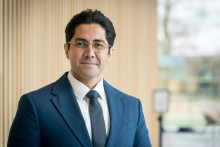In response to the proposed Internationalisation in Balance act, the Psychology programme decided in September 2024 to offer both a Dutch and an English track for the upcoming academic year. This has resulted in 100 preliminary registrations for the Dutch track and 120 for the English track for the September 2025 cohort – a 40% to 60% split.
‘Relatively unknown’
Programme director Christina Bode notes that there were only four months between the decision and the final application deadline. “Moreover, the University of Twente still has the image of being a technical university in the Netherlands, so it's relatively unknown that we also offer social sciences – and therefore a Psychology degree,” she explains. “I see this as a real achievement by the programme and the Marketing and Communication department. Personally, I expected lower numbers. And this is only the first time we're offering this. I believe we haven't yet reached all potentially interested students in time – next year the numbers could well be higher.”
Gradual implementation
Bode outlines how the Dutch-language track will be introduced. “From September onwards, both tracks will start for first-year students. Implementation will follow them as they progress. So students who are currently in their second or third year won’t yet have the option to take courses in Dutch.”
Still a bit of English
That said, the Dutch-language track does not mean that students will never hear English. “Lectures and literature discussions will remain in English, because most academic literature is simply in English. Students from both tracks will come together for those sessions. It’s good practice for the students, easier to organise, and it ensures that they still experience the benefits of an international classroom. We are still exploring how best to integrate the Dutch-language track into projects and practical assignments for each module. The more actively students engage with the content themselves, the more Dutch we can incorporate into the Dutch track. But it’s a real puzzle,” she admits.
Language training for lecturers
For some international lecturers, this presents a challenge. “That’s why we’re in talks with the Language Centre to explore how we can help lecturers quickly achieve the required level of Dutch for subject-specific teaching.”
Still, Bode is cautious in her optimism about the enrolment figures: “It’s not September yet – a lot can happen in the lives of students before then, so the final numbers may still shift.”





